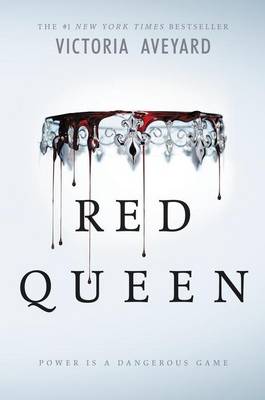Reviewed by girlinthepages on
There’s no denying that Red Queen is laden with tropes that span across dozens of other popular YA series. There are elements of The Hunger Games (fighting in arenas for a political spectacle), The Selection series (Queenstrial, in which daughters from all the high houses show off as prospective brides to the heir of the throne), and especially the Grisha trilogy (the upper class have different elemental/physical/psychological powers, and are often identified by their colors). It honestly was like a big mash-up of all of the popular series out so far, without bringing anything particularly unique to the table. I was SO curious about WHY and HOW evolution had turned certain members of society into silver-blooded super humans, but there was no explanation for the physiological difference that the entire social structure was based on, which really, really disappointed me. I really think the blood aspect is where Red Queen could have stood out, but it is basically just a fact some citizens were silver and some were red, and readers have to accept it.
The characters were the aspect of the novel that really kept pushing me away and pulling me back in. Some characters, such as Mare, are sadly forgettable, placeholders for actions that were mandatory for the genre. Of course it’s a poor girl from a family living in squalor who’s special and different. Of course she has a childhood friend who’s raging with jealousy when she hooks up with princes and joins the revolution out of spite. Of course there’s a seriously twisted royal family. However, the saving grace for this book for me was the fact that I really, really love Cal. I don’t necessarily love how the romance between Mare and him goes down (let’s be real, the book tries to juggle a love rectangle) but I love him as a character: responsible, logical, puts his country before his passion. A lot of readers would probably read his character and be bored by him, but it was so refreshing to see a male lead who wasn’t some cocky bad boy/rebellious revolutionary/etc who the protagonist managed to manipulate into sacrificing everything for love. Cal is also an enigma because he’s technically on the “bad” side (the silver oppressors) but his political reasoning and justifications for keeping the status quo as heir to the throne, combined with a critical awareness of the injustice of society makes him feel real. He struggles with his beliefs, but he also struggles to implement change, just as most people do. I really felt that he was a refreshing love interest (or maybe I’m just getting old and prefer the responsible to the reckless!)
The writing itself is easy to read but wasn’t especially sophisticated. I found that there were a lot of repetitive turns of phrase (the silvers are constantly referenced as “Gods” and everyone is constantly smirking, like it’s the only facial expression they know). Yet I finished it fairly quickly, and the last quarter of the book does have several big plot twists (I saw most of them coming but I still appreciated them) which lead to a lot of action that is compulsively readable. There is a pretty epic battle near the end and a cliffhanger ending that accomplishes its job at enticing me to read the sequel and care what happens.
Overall: If you like dystopians, and you don’t mind seeing elements here that appear in a lot of other YA series, Red Queen is a decent read. It moves around at a fast clip, the powers and training/battle scenes are pretty cool, and it has all the requisite revolutionary stuff (Mare is basically the Mockingjay). It does get pretty action packed toward the end, has some pretty deranged characters, and puts an emphasis on Mare’s family and her ties to her upbringing (which was nice, since family is so often downplayed in YA). However, the novel misses its chance to develop its own unique elements in the over-saturated dystopian market, with little explanation as to how the blood differentiation came about. I wavered between giving it 2 or 3 stars, but ultimately decided that for what it is, it did a decent job. I’m still optimistic that the sequels could be better, but if you’re familiar with any of the popular YA dystopians from the past few years, Red Queen won’t necessarily stand out.
You can read this review and more at my blog Girl in the Pages.
Reading updates
- Started reading
- 27 February, 2015: Finished reading
- 27 February, 2015: Reviewed
